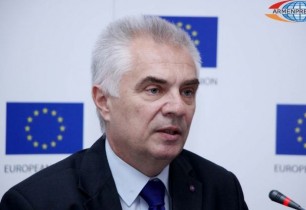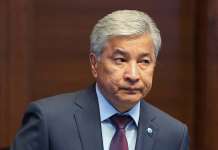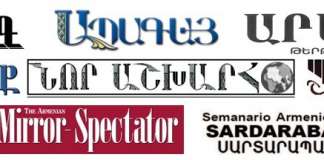The EU ambassador to Armenia said Friday they observe an increased interest among Armenians in the future of mutual relations, a fact which he described as an additional stimulus also for their delegation’s activities in the country.
Speaking at the public forum organized by the Partnership for Open Society Initiative, Pirotr Switalski said they have now entered into a busy period in developing the framework of future relations.
“We are now going through a very busy period in our contacts and relations. The negotiations on the new framework agreement are under way, and they have entered, in my view, intp a period of a very intensified pace,” he said, agreeing to a remark by Karen Nazaryan, a deputy foreign minister who also attended the event.
Mr Switatalsky further unveiled plans for discussing partnership priorities within the framework of the revised neighborhood policy, adding that they are now discussing a the contents of the single support framework (which will define the cooperation priorities including the EU assistance to Armenia).
Describing the EU as the biggest donor in Armenia, the ambassador also highlighted the importance of the developments in progress, considering them serious processes determining the future practical content of the relations.
“To understand what contents the European Union [has] in its relations in Armenia, I would like to suggest that we take a step back and try to analyze this relationship against the background of the global strategy of the European Union and the neighborhood policy. Last week I had the pleasure to introduce the strategy of the European Union, and when you look into the document, you will see that the priority of the European Union in its neighborhood is state and societal resilience. That’s the strategic objective which is guiding also our policies towards Armenia. It dovetails with what is the main scene of the reviewed neighborhood policy which was presented last November, i.e. – the scene of stabilization.
“So these two simple terms, resilience and stabilization, are the essence of the European Union policy also towards Armenia,” he said.
The ambassador later went on to elaborate on the priorities.
“First, we want to contribute to the economic stabilization of Armenia; we want Armenia to develop better, to have better growth and better opportunities for employment, particularly youth employment. Youth and small and medium enterprises are for us the key elements, the key leverages to improve the prospects of growth for Armenia,” he said, describing good governance as the next priority stemming from resilience and stabilization.
Mr Switalski reiterated the EU’s desire to help Armenia reform public administration, build independent and efficient judiciary, adopt European standards of human rights protection etc.
The EU’s third priority in Armenia is connectivity, he added. “We want to help Armenia to be better connected to Europe – in terms of infrastructure, roads, but also electricity connections and people-to-people contact, cultural exchanges,” he added.
















